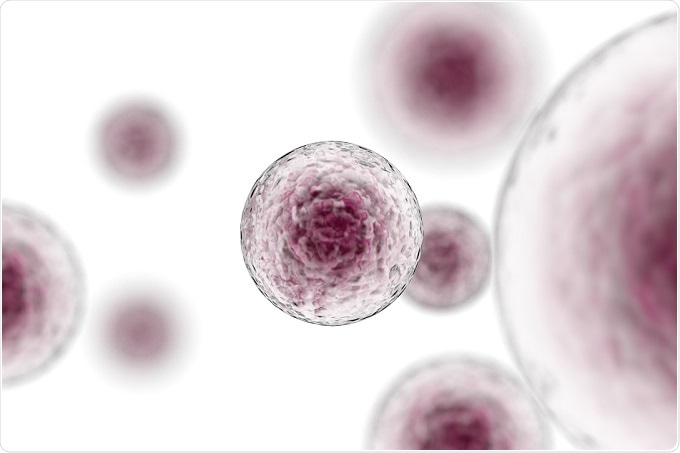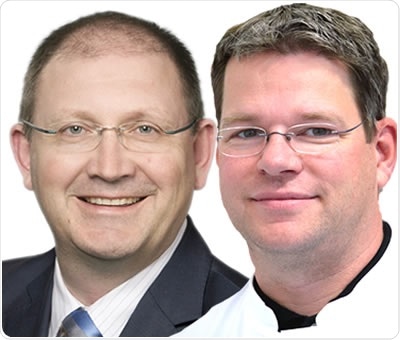An interview with Professor Stefan Jockenhövel and Professor Christian Apel conducted by April Cashin-Garbutt, MA (Cantab)
Please can you give a brief introduction to your research?
We are working in the field of biomedical engineering and our specific focus is on the development of biohybrid medical systems or biohybrid implants. That means we combine a technical structure with a biological function to make medical systems and implants performing better.
 Credit: CI Photos/Shutterstock.com
Credit: CI Photos/Shutterstock.com
Can you describe your specific workflow?
Our specific workflow is developing patient customized implants. We harvest cells from the patient, we cultivate the cells as the biological component of our biohybrid implants.
Our specific focus is on the development of textile-reinforced implants. The process used is a moulding technology based on a hydrogel scaffold as cell carrier, developed at the BioTex Institute fifteen years ago.
What were the main factors that influenced your recent decision to move from manual liquid handling to automated liquid handling with the Biomek from Beckman Coulter?
The critical point in the processing of cells is the risk of contamination by the human operator. Furthermore, each operator has individual differences in the handling of the different components in the process influencing the (re)producibility in the process significantly. Automated processing makes the whole process much more efficient, more reliable and standardized. That was the main reason we decided on an automatized system.
Secondly, it's a question of using the human resources in an efficient way. We don’t want that highly educated staff members waste their time doing very simple routine work.
How does automation compare in terms of throughput, ergonomics and sample savings to manual?
From the economical point of view, we believe that if you want to translate the highly-customized patient implants to the market, it's important to automate processes, more and more.
It starts with cell harvesting, which you cannot automate, but the cultivation of the cells and the later production processes can be nicely automized with the system. Doing it all by hand, just manually, requires experienced people who know how to do it. It's not something where you can build on a reliable production process.
Was there a large learning curve with the Biomek? How quickly were you able to get the workflow up and running with automation?
We are in the very early phase as we have started at the beginning of this year. It took a little time to get familiar with the system and to get the right introduction.
The most time-consuming aspects have been translating the processes into the automized system, learning to think in a different way and organizing all the steps in that system, as there is quite a difference between doing it manually and “instructing” the computer doing it.
Moving forward, what impact has your automation had and what will it have on the work in your lab?
Firstly, it will hopefully free up time for our research. Secondly, we are an academic institute and I believe that everybody who is working and dealing with biomedical engineering and cell-related biomedical engineering will use automization in the future.
From the training aspect, I think it is very important that people getting trained in and getting used to dealing with automized processes in a biological environment. I think that also really adds value from the teaching perspective.
Last but not least, we need billions of adherence cells per year, which makes more processes possible and the cell cultivation, which is now 24/7, can provide much more cells in a shorter time and also increase the number of experiments we can perform. This is an important aspect.
What are some of the differences that might complicate the transition of a new technology from the university setting to industry?
The challenges are that we need to have standardized processes and to move away from manual manufacturing to industrial production. If we want to have a chance in the clinic, those automation steps are essential, if not the implants will never find a place in the clinic.
You cannot manufacture all these things, so we must make it as standardized as possible. That is where the automatization is extremely important, not only regarding what we're doing with pipetting, handling and cell cultivation, but also regarding bioreactor systems from the moulding process, finally to the inline evaluation as final proof in the production process.
What role can automation providers, such as Beckman Coulter, play to facilitate or increase the success of such transition?
I think what Beckman Coulter provide is a platform technology that, when I look at our machines, seems to be based on a highly-individualized process that is finely tuned and adapted to our needs. These needs were not easy and Beckman Coulter managed to do so.
In the future, this is just on the first level, the cellular level; the next level will be on the tissue level. At that point we can build on the Beckman Coulter platform to increase the level of complexity. That is the reason why we have chosen Beckman Coulter and their technology.
About Professor Stefan Jockenhövel and Professor Christian Apel

Prof. Stefan Jockenhoevel: His background is in thoracic and cardiovascular surgery, where he has worked as a clinician over 11 years. He is a full professor at the RWTH Aachen University as a transfaculty professorship between mechanical engineering (ITA-Institute for Textile Engineering, faculty of mechanical engineering) and the biomedical engineering (AME-Helmholtz Institute for Biomedical Engineering, Medical Faculty).
Furthermore he is the director of the Aachen-Maastricht-Institute for Biobased Materials, a transborder institute between the University Maastricht, NL, the Fraunhofer IME (Aachen, GER) and the RWTH Aachen University (GER).
Prof. Christian Apel studied dentistry and worked as dentist and clinical scientist over 14 years. He owned an assistant professorship for Experimental Caries Prevention and Therapy at RWTH Aachen University and spent two years as visiting professor at the University of São Paulo, Brazil. Presently he work as associate professor at the Medical Faculty of RWTH Aachen University and is the vice director of the department for Biohybrid & Medical Textiles, Applied Medical Engineering at RWTH Aachen University.